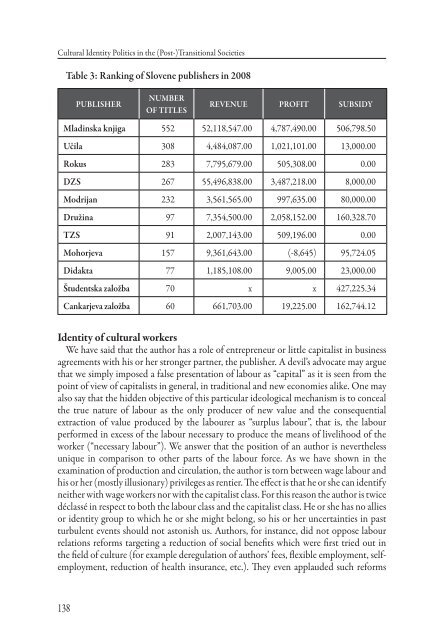Cultural Identity Politics in the (Post-)Transitional Societies
Cultural Identity Politics in the (Post-)Transitional Societies
Cultural Identity Politics in the (Post-)Transitional Societies
Create successful ePaper yourself
Turn your PDF publications into a flip-book with our unique Google optimized e-Paper software.
<strong>Cultural</strong> <strong>Identity</strong> <strong>Politics</strong> <strong>in</strong> <strong>the</strong> (<strong>Post</strong>-)<strong>Transitional</strong> <strong>Societies</strong><br />
Table 3: Rank<strong>in</strong>g of Slovene publishers <strong>in</strong> 2008<br />
PUBLISHER<br />
NUMBER<br />
OF TITLES<br />
REVENUE PROFIT SUBSIDY<br />
Mlad<strong>in</strong>ska knjiga 552 52,118,547.00 4,787,490.00 506,798.50<br />
Učila 308 4,484,087.00 1,021,101.00 13,000.00<br />
Rokus 283 7,795,679.00 505,308.00 0.00<br />
DZS 267 55,496,838.00 3,487,218.00 8,000.00<br />
Modrijan 232 3,561,565.00 997,635.00 80,000.00<br />
Druž<strong>in</strong>a 97 7,354,500.00 2,058,152.00 160,328.70<br />
TZS 91 2,007,143.00 509,196.00 0.00<br />
Mohorjeva 157 9,361,643.00 (-8,645) 95,724.05<br />
Didakta 77 1,185,108.00 9,005.00 23,000.00<br />
Študentska založba 70 x x 427,225.34<br />
Cankarjeva založba 60 661,703.00 19,225.00 162,744.12<br />
<strong>Identity</strong> of cultural workers<br />
We have said that <strong>the</strong> author has a role of entrepreneur or little capitalist <strong>in</strong> bus<strong>in</strong>ess<br />
agreements with his or her stronger partner, <strong>the</strong> publisher. A devil’s advocate may argue<br />
that we simply imposed a false presentation of labour as “capital” as it is seen from <strong>the</strong><br />
po<strong>in</strong>t of view of capitalists <strong>in</strong> general, <strong>in</strong> traditional and new economies alike. One may<br />
also say that <strong>the</strong> hidden objective of this particular ideological mechanism is to conceal<br />
<strong>the</strong> true nature of labour as <strong>the</strong> only producer of new value and <strong>the</strong> consequential<br />
extraction of value produced by <strong>the</strong> labourer as “surplus labour”, that is, <strong>the</strong> labour<br />
performed <strong>in</strong> excess of <strong>the</strong> labour necessary to produce <strong>the</strong> means of livelihood of <strong>the</strong><br />
worker (“necessary labour”). We answer that <strong>the</strong> position of an author is never<strong>the</strong>less<br />
unique <strong>in</strong> comparison to o<strong>the</strong>r parts of <strong>the</strong> labour force. As we have shown <strong>in</strong> <strong>the</strong><br />
exam<strong>in</strong>ation of production and circulation, <strong>the</strong> author is torn between wage labour and<br />
his or her (mostly illusionary) privileges as rentier. The effect is that he or she can identify<br />
nei<strong>the</strong>r with wage workers nor with <strong>the</strong> capitalist class. For this reason <strong>the</strong> author is twice<br />
déclassé <strong>in</strong> respect to both <strong>the</strong> labour class and <strong>the</strong> capitalist class. He or she has no allies<br />
or identity group to which he or she might belong, so his or her uncerta<strong>in</strong>ties <strong>in</strong> past<br />
turbulent events should not astonish us. Authors, for <strong>in</strong>stance, did not oppose labour<br />
relations reforms target<strong>in</strong>g a reduction of social benefits which were first tried out <strong>in</strong><br />
<strong>the</strong> field of culture (for example deregulation of authors’ fees, flexible employment, selfemployment,<br />
reduction of health <strong>in</strong>surance, etc.). They even applauded such reforms<br />
138




